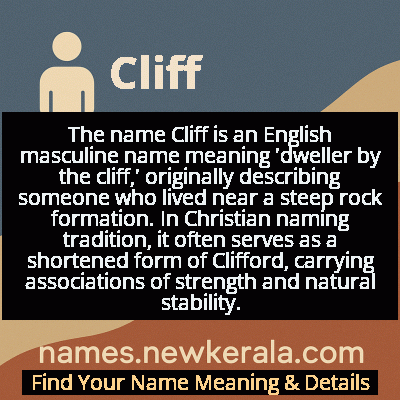Cliff Name Meaning & Details
Origin, Popularity, Numerology Analysis & Name Meaning of Cliff
Discover the origin, meaning, and cultural significance of the name CLIFF. Delve into its historical roots and explore the lasting impact it has had on communities and traditions.
Name
Cliff
Gender
Male
Origin
Christian
Lucky Number
9
Meaning of the Name - Cliff
The name Cliff is an English masculine name meaning 'dweller by the cliff,' originally describing someone who lived near a steep rock formation. In Christian naming tradition, it often serves as a shortened form of Clifford, carrying associations of strength and natural stability.
Cliff - Complete Numerology Analysis
Your Numerology Number
Based on Pythagorean Numerology System
Ruling Planet
Mars
Positive Nature
Generous, passionate, energetic, and humanitarian.
Negative Traits
Impulsive, impatient, moody, and can be overly emotional.
Lucky Colours
Red, maroon, scarlet.
Lucky Days
Tuesday.
Lucky Stones
Red coral, garnet.
Harmony Numbers
1, 2, 3, 6.
Best Suited Professions
Military, sports, philanthropy, leadership roles.
What People Like About You
Courage, energy, leadership, generosity.
Famous People Named Cliff
Cliff Richard
Singer
British pop icon with over 250 million records sold
Cliff Robertson
Actor
Academy Award winner for Best Actor in 'Charly'
Cliff Burton
Musician
Influential bassist for Metallica
Cliff Lee
Baseball Player
Cy Young Award winner and 4-time MLB All-Star
Name Variations & International Equivalents
Click on blue names to explore their detailed meanings. Gray names with will be available soon.
Cultural & Historical Significance
Extended Personality Analysis
Men named Cliff are often associated with strength, reliability, and steadfast character, mirroring the durable nature of the geological feature that inspired their name. There's a common perception that Cliffs possess natural leadership qualities and emotional stability, able to remain calm and decisive in challenging situations. The name suggests someone who provides a solid foundation for others, much like a cliff offers shelter and protection from the elements. This doesn't necessarily mean inflexibility, but rather consistent principles and dependable behavior. Many people expect Cliffs to be practical problem-solvers with a no-nonsense approach to life's difficulties. The association with high places also suggests perspective and vision – the ability to see situations clearly and make informed decisions. These perceived traits often create a self-fulfilling prophecy where men named Cliff develop these characteristics through social expectations and their own identification with the name's strong, natural imagery.
Modern Usage & Popularity
In contemporary naming practices, Cliff has become a less common choice, ranking outside the top 1000 baby names in the United States in recent years. However, it maintains a presence as a classic, no-frills masculine name that appeals to parents seeking strong, single-syllable options. The name's peak popularity occurred from the 1930s through 1960s, influenced by celebrities and cultural figures of that era. Today, it's often chosen by parents looking for names with natural imagery or family significance, particularly those with English heritage. While not currently trending, Cliff retains a timeless quality that prevents it from feeling dated. The name continues to be used across English-speaking countries, with occasional appearances in popular culture helping to maintain its recognition. Its simplicity and strong consonant sounds make it memorable and easy to pronounce, contributing to its enduring, if modest, usage.
Symbolic & Spiritual Meanings
Symbolically, the name Cliff represents strength, endurance, and natural boundaries in both physical and metaphorical senses. Like the geological formation it references, the name suggests someone who provides protection and stability, serving as a reliable foundation during turbulent times. Cliffs often mark transitions between different environments, symbolizing the ability to navigate change while maintaining core stability. The metaphorical 'edge of the cliff' can represent courage in facing uncertainty or standing at decisive moments in life. In many spiritual traditions, high places like cliffs are considered closer to the divine, suggesting that the name carries connotations of elevated perspective and spiritual awareness. The name also symbolizes the meeting of different elements – earth, sky, and often water – representing balance and connection between seemingly opposing forces. This multifaceted symbolism makes Cliff a name rich with meaning beyond its simple topographic origins.

